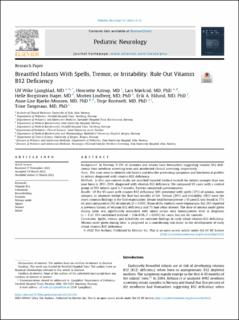| dc.contributor.author | Ljungblad, Ulf Wike | |
| dc.contributor.author | Astrup, Henriette | |
| dc.contributor.author | Mørkrid, Lars | |
| dc.contributor.author | Hager, Helle Borgstrøm | |
| dc.contributor.author | Lindberg, Morten | |
| dc.contributor.author | Eklund, Erik A. | |
| dc.contributor.author | Monsen, Anne-Lise Bjørke | |
| dc.contributor.author | Rootwelt-Revheim, Terje | |
| dc.contributor.author | Tangeraas, Trine | |
| dc.date.accessioned | 2022-07-05T09:25:25Z | |
| dc.date.available | 2022-07-05T09:25:25Z | |
| dc.date.created | 2022-03-28T10:26:36Z | |
| dc.date.issued | 2022 | |
| dc.identifier.issn | 0887-8994 | |
| dc.identifier.uri | https://hdl.handle.net/11250/3002717 | |
| dc.description.abstract | Background: In Norway, 5-10% of neonates and infants have biomarkers suggesting vitamin B12 deficiency from newborn screening tests and unselected clinical screening, respectively.
Aims: The aims were to identify risk factors and describe presenting symptoms and biochemical profiles in infants diagnosed with vitamin B12 deficiency.
Methods: In this case-control study, we searched hospital medical records for infants younger than one year born in 2011-2018, diagnosed with vitamin B12 deficiency. We compared 85 cases with a control group of 252 infants aged 3-7 months. Parents completed questionnaires.
Results: Of the 85 cases with vitamin B12 deficiency, 80% presented with spells (37%) of apneas, motor seizures, or absences within the first two months of life. Tremor (29%) and irritability (18%) were the most common findings at the first examination. Serum total homocysteine ≥10 μmol/L was found in 77% of cases compared to 28% of controls (P < 0.001). None of the mothers were vegetarians, but 25% reported a previous history of vitamin B12 deficiency and 7% had celiac disease. The dose of nitrous oxide given during labor was significantly associated with infant serum total homocysteine level at diagnosis (r = 0.37, 95% confidence interval = 0.16-0.55, P < 0.001) for cases, but not for controls.
Conclusion: Spells, tremor, and irritability are common findings in early infant vitamin B12 deficiency. Nitrous oxide given during labor is proposed as a contributing risk factor to the development of early infant vitamin B12 deficiency. | en_US |
| dc.language.iso | eng | en_US |
| dc.publisher | Elsevier | en_US |
| dc.rights | Navngivelse 4.0 Internasjonal | * |
| dc.rights.uri | http://creativecommons.org/licenses/by/4.0/deed.no | * |
| dc.title | Breastfed Infants With Spells, Tremor, or Irritability: Rule Out Vitamin B12 Deficiency | en_US |
| dc.type | Journal article | en_US |
| dc.type | Peer reviewed | en_US |
| dc.description.version | publishedVersion | en_US |
| dc.rights.holder | Copyright 2022 the authors | en_US |
| cristin.ispublished | true | |
| cristin.fulltext | original | |
| cristin.qualitycode | 1 | |
| dc.identifier.doi | 10.1016/j.pediatrneurol.2022.03.003 | |
| dc.identifier.cristin | 2012916 | |
| dc.source.journal | Pediatric Neurology | en_US |
| dc.source.pagenumber | 4-12 | en_US |
| dc.identifier.citation | Pediatric Neurology. 2022, 131, 4-12. | en_US |
| dc.source.volume | 131 | en_US |

